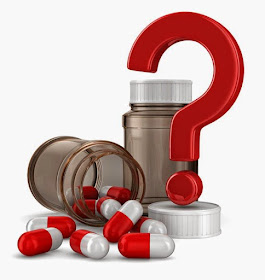Shabbir J. Safdar, Executive Director of the Partnership for Safe Medicines
Brandon M. Macsata, CEO, ADAP Advocacy Association
If you are taking a life-saving HIV medication right now, or any kind of life saving medication, you probably have two big concerns: “Can I afford my medicine if my economic status changes?” and “Will my medicine be in short supply? Will people do to medicines what they have done to toilet paper?”
 |
| Photo Source: USA Today |
If you are concerned about affording medication, we strongly suggest exploring the tips in our COVID-19 one pager [English PDF, Spanish PDF] where we talk about the options offered by NeedyMeds, RXOutreach, and MedicationAssistanceTool.
If you are concerned about supply, don't turn to the wild west of foreign web pharmacies. That's more dangerous now than ever. Online scammers pretending to be Canadian, or in some cases actual Canadian criminals, have been perfecting their perfect-looking counterfeits and their fake-but-real looking web pharmacies for twenty years. You can find safe, U.S.-licensed online pharmacies at www.safe.pharmacy. No foreign pharmacy (even if it’s licensed in a trustworthy foreign country, like Canada) is safe for Americans to buy from.
But the good news is that you probably won’t have to. The American Medical Association has warned physicians against non-medically necessary prescribing to enable panic-buying. And pharmacy boards like those in Idaho, Texas, Nevada, West Virginia, and Ohio are tightening rules around prescriptions of medications, especially medicines like chloroquine, which may or may not be effective treatments for COVID-19. (For your reference, the National Alliance of State Pharmacy Associations is keeping a continuously updated list of state actions affecting Hydroxychloroquine, Chloroquine, and Azithromycin).
In the HIV space, ADAP Advocacy Association has published statements from nearly all the major manufacturers explaining that their supply is secure for the next twelve months, so panic-buying your medication is not advised, and if we all did it, would create a shortage where one does not exist today.
 |
| Photo Source: master control.com |
Ok, but what if I’m still concerned about making sure I’ve got enough medication for myself?
Talk to your pharmacist (and if you don’t do that often, go meet your pharmacist)
Call your pharmacist. If you can’t get them on the phone, you can go see them, but in this time of social distancing they would probably prefer a phone call. If you don’t have a relationship with your pharmacist this is a great time to begin one.
Let your pharmacist know about your medication needs for the next three to six months. If everyone orders a year’s supply of medication at once, the rush could create shortages. If your pharmacist knows about your needs, they can take them into account when they are ordering stock.
Plan to refill your prescription a ten-days ahead of time
If there is a shortage, your pharmacist has options to secure enough medicine for you, but they will need enough time to work it out. If you go in ten days ahead of time, that will give your pharmacist enough notice. If your insurance doesn’t allow you to refill ten days out, then call your pharmacist ten days out to let them know you’ll be coming in for a refill.
Ask your prescriber and pharmacist about a 90-day prescription
If you want to minimize trips to the pharmacy during this time, ask your prescriber about writing you a prescription for a 90-day supply instead of 30 days. Your pharmacist can tell you in advance if your insurance will cover a 90-day prescription before you even contact your physician.
Pharmacists and pharmacy techs may be the healthcare professionals you see the most often, and they know a great deal about medicine, the supply chain, and the best way to help you afford your medications. But they are working long stressful hours right now instead of sheltering at home---and they may need a little bit of planning to be your best ally.
Disclaimer: Guest blogs do not necessarily reflect the views of the ADAP Advocacy Association, but rather they provide a neutral platform whereby the author serves to promote open, honest discussion about public health-related issues and updates.
No comments:
Post a Comment